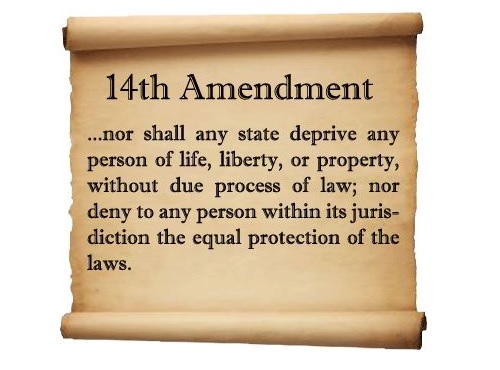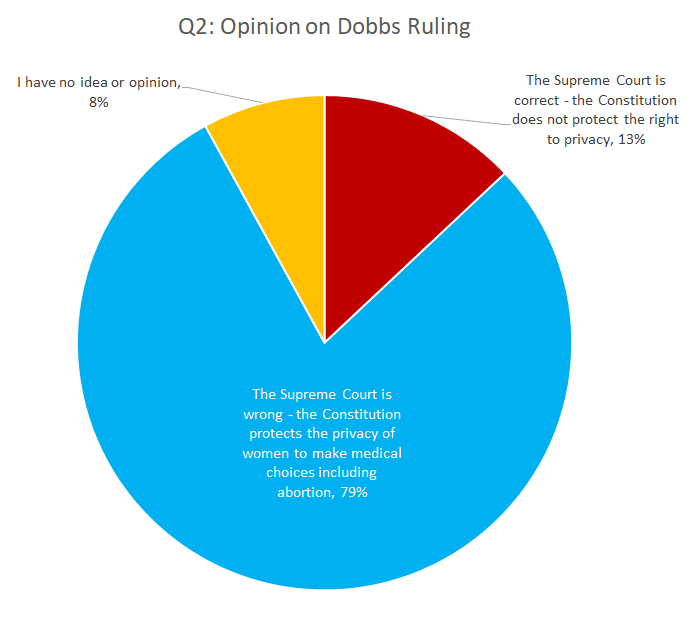
2022 Constitution Day: The Right to Privacy

Today, September 17, is Constitution Day! Federal law requires colleges and universities to observe this day in whatever manner seems appropriate for the community. This blog shares results of a campus survey about the right to privacy in light of the Supreme Court’s ruling in Dobbs v. Jackson Women’s Health Organization overturning Roe v. Wade, the 1972 Supreme Court ruling that recognized a woman’s right to have an abortion as protected by the right to privacy implied in the Constitution. An earlier case, the 1965 ruling in Griswold v. Connecticut, established the right to privacy for married couples using birth control, saying that while the Constitution did not explicitly state the right to privacy, that right is implied in the “penumbra” of several amendments including the 14th Amendment’s guarantee of the right to due process. Some legal commentators now speculate that the Dobbs ruling overturning Roe might also rollback the protections that Griswold accorded to the use of birth control — but that remains to be seen in future rulings and state legislation.
Catholic leaders hailed the Dobbs decision as a victory for the protection of human life. Catholic teachings view abortion as a grave moral evil, and the Church has advocated for the overturning of Roe v. Wade for decades. Nevertheless, many Catholics, people of other faiths and those who abhor abortion still view Dobbs with alarm because of its potentially sweeping impact on many other rights that the American public thought were long-settled. Disagreement exists about whether abortion should be criminalized, even among those who agree with the Church’s teachings. Even as the debate continues, a number of states are acting quickly to limit or completely ban abortion. The legal, moral and political questions will continue to rage for many years.
Trinity students, faculty and staff have responded to a survey asking their opinions about the right to privacy and the abortion issue. Below are preliminary results from the survey, which is ongoing — final results will be published next week.
These are opinion survey results with answers from students, faculty and staff at Trinity; the results do not reflect Trinity’s official position which is in keeping with Church teachings, but it’s important for us to know what the community thinks about these difficult issues.
Question 1: The U.S. Constitution guarantees certain rights (such as freedom of speech and religion) but does not explicitly guarantee a right to privacy. Should there be a constitutional amendment to create an explicit right to privacy?
61% – YES
13% – NO
26% – MAYBE
Comments:
“The right to privacy can easily be taken away by a Supreme Court ruling. It is imperative in these times all citizens be granted and guaranteed the right to it.”
“I think in the digital age when private data gets used, abused, stolen so frequently, having a Constitutional right to privacy will provide an additional layer of legal recourse for people to protect their information, identity, and individual freedom.”
“The right to privacy for human life in church and society should be spelled out, as it is a God-given right that each individual holds a ‘sanctum’, an ‘inner forum’ in choosing to act on moral objectives, and this right should be parallel to our Constitutional Rights and Amendments.”
“In theory, a right to privacy would seem like an obvious “yes.” In practice, however, determining what is “private” for such a right would be difficult even without the political and legal battles that would follow. Or perhaps it wouldn’t need to be. Could there be a right to personal privacy in all matters that are not an explicitly illegal act? Using abortion as an example, could internet search history be protected even if the abortion itself was punishable in a state? Unfortunately, the same would hold true for domestic terrorists plotting an attack where we know that internet history has been used to prevent murders. In some minds, these are the same. We know there are real challenges in determining what is protected with freedom of speech, for example. Privacy is a much more vague concept with inherently greater challenges.”
“The government is taking too many liberties with our private information.”
Question 2: In June 2022, in the Dobbs case, the Supreme Court overruled Roe v. Wade that was the 1972 precedent protecting abortion rights. Roe was based on an interpretation of the Constitution’s implicit right to privacy. What is your opinion of the Supreme Court’s ruling in the Dobbs case?
 Comments:
Comments:
“This ruling is a step backwards to women having the right to make choices about their own body. The constitution protects rights for freedoms; the freedom is the key, which means we have choices and now we have choices if we live in the right states, that’s not freedom as the constitution states.”
“The decision to make abortion illegal in federal and state law in the Dobbs case is an attempt to protect the fetus, yet it overrides the rights of the woman to make decisions based on her right to choose (and her right to privacy). For those who believe that the fetus and the mother hold equal rights to life, the decision not to abort is freely given and the woman can decline the right to an abortion. The choice is hers to make, preferably with medical advice in instances where complications exist. The Dobbs decision has removed the right to choose from women who, in pregnancy, decide to abort the fetus within her. It has been her choice for 50 years in the US, and yet, due to recent Supreme Court action, that right is thrown into question and removed from her options during a pregnancy that reveals complications or threats to the mother’s health. Dobbs removed privacy that women are accustomed to in these matters and places all agents surrounding abortion activity in line for sentencing and possibly jailtime for those participating in the (previously private) matter, including the neighbor who drives the woman to her appointment! This Dobbs decision feels so regressive in our time. We are made with rights- human rights- to safety, life, speech, happiness, prosperity, and adult decision-making. Let’s continue our Constitutional study about the right to privacy in American life.”
“People should be able to make medical decisions about their body, period.”
“I am a woman no other explanation needed.”
Questions 3 and 4 asked for additional comments about the right to privacy and the issue of abortion. Results:
13% said that abortion is a serious moral problem and should be limited
84% said that abortion is a personal choice that the law should not regulate
Comments:
“Making abortions illegal will significantly affect underprivileged, low-income, and uneducated women, who need to have the right to choose, the most. Others with privilege will simply go to a state that still allows abortions, and return home unaffected by the lack of rights in their home state. I strongly support a federal law regarding abortion rights because when left on their own, states may do exactly what they are doing now. Think about if Civil Rights and workplace discrimination were still left up to the states to decide…injustices would be rampant. We all know how that would play out!”
“I understand that abortion is a religious and political conflict that many people have opinions about. My opinion is that God is the only being that has a right to judge us as human beings in the decisions we make. I personally do not like the idea of a fetus being aborted, but I also do not agree with stripping a person’s rights away. Everyone has a right to make their own decisions about themselves.”
“Abortion is only justified when it is necessary to save the life of the mother and it should be legal only in those cases.”
“Abortion is a MEDICAL decision between a woman [family] and her doctor. It is not any of my business what someone decides to do. What my personal religious belief are of no concern. God said do not judge so I try cast no judgement onto the decisions other people make for their life, especially the medical ones. In the medical field a miscarriage is called a spontaneous abortion because that is what it is. Currently woman are sitting in jail all around the country for having one. There is no medical test to tell the difference between a spontaneous abortion and an induced abortion. When you regulate one you regulate them all but the issue is you can never regulate them correctly. Someone always gets hurt and it’s women and children.”
“Abortion is a healthcare. Healthcare decisions should be made by a person and their doctor. Since the Court’s decision this summer, we have already heard of all kinds of health problems women are having getting healthcare – even women who are not having an abortion.”
“Although I personally believe abortion is wrong and that if you create a life, you are responsible for caring for it, I do not think the government has any business in this issue whatsoever. If women are free to choose abortion, then it protects our medical providers, it protects women who are victims of rape and abuse who for whatever reason are unable or unwilling to come forward with that information, it protects women who have miscarriages that otherwise might be under suspicion for having an abortion, and it protects women who have health complications that might not be spelled out in a law that states when abortion is ok. If a woman chooses to have an abortion under circumstances that I would consider to be morally wrong, that that is between her and God and He alone can pass judgement. It is not between her and government.”
“I worry about my daughter and my future children’s future. I pray to God everyday that my daughter and all my children will live a full healthy life and that no predator gets in the way of their future. The government needs to do better and I do not feel safe. The government in many ways feels like the predator.”
“Despite it’s imperfections and differences in interpretation, I think we are incredibly blessed to have a document that has protected so many of our freedoms and inspired similar documents that protect human rights and freedoms in countries around the world.”
“The Constitution should reflect the will of the people, not the politicians. Too bad everything is not a simple majority rules.”
“We should think about our Constitutional rights more than once a year, however, once a year is better than not at all…”
The survey is still open and this blog will be updated later in the week when the survey closes. Thanks to all for your participation.